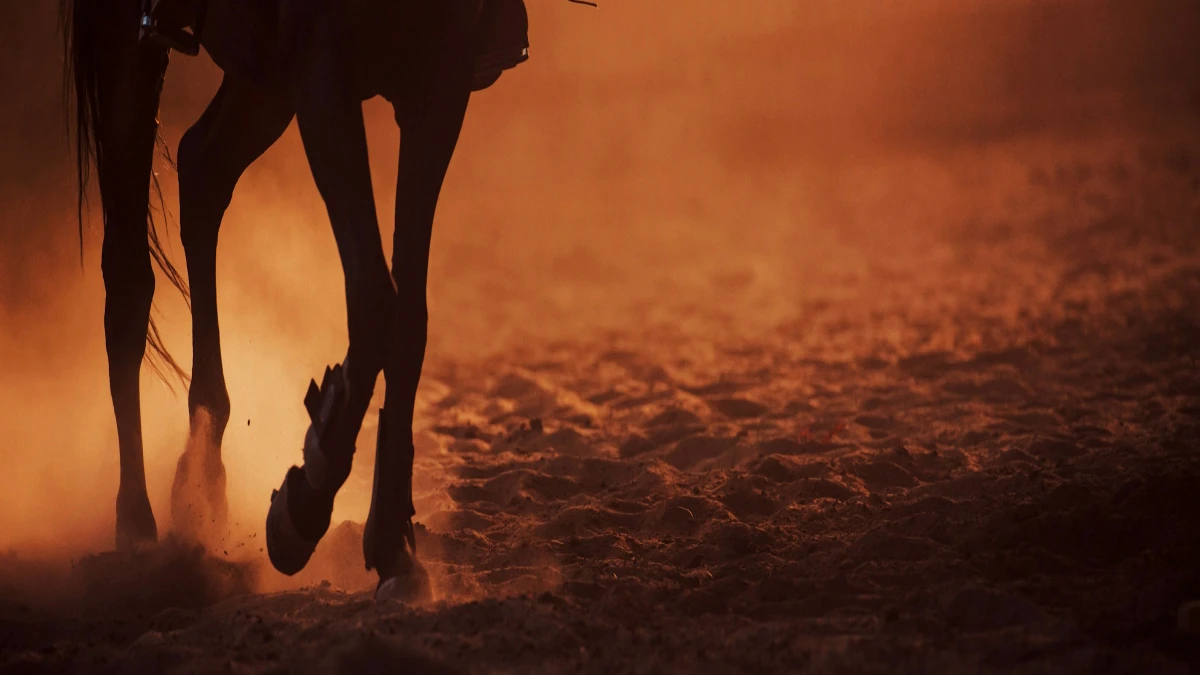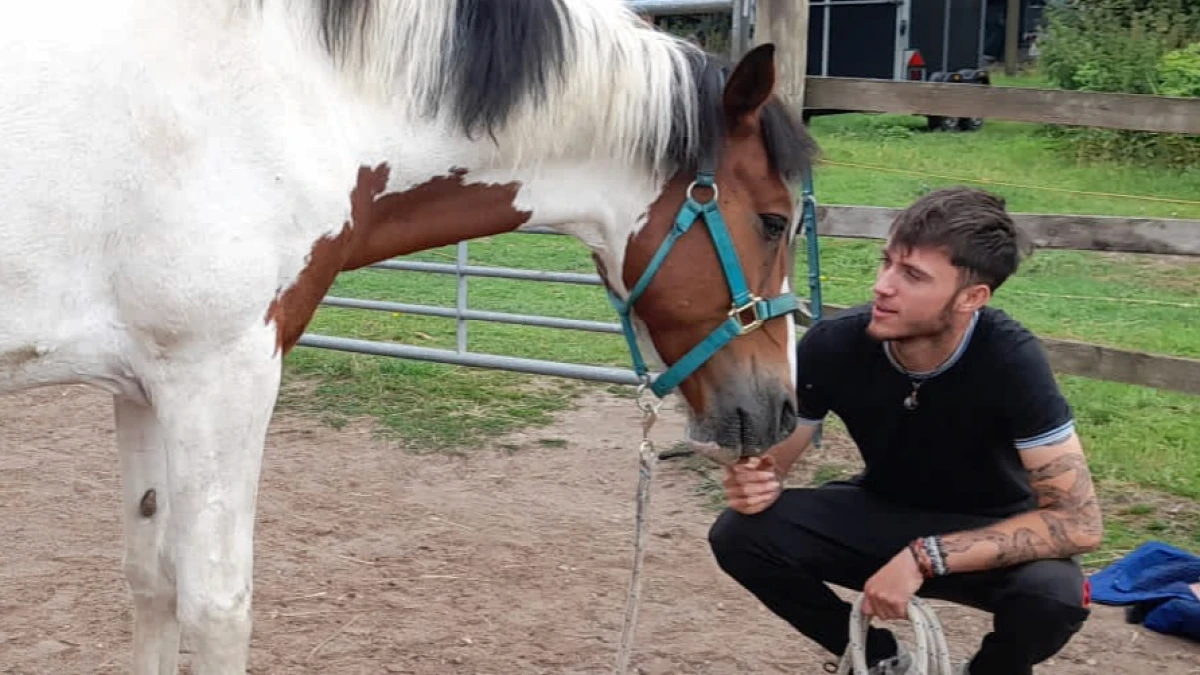Understanding Behavioural Changes in Horses
May 31, 2025 by Jamie Finch

Whether it’s a shift in behaviour under saddle, a new attitude in the stable, or changes in how they interact on the ground, behavioural changes can feel sudden and confusing.
But horses never change behaviour without a reason.
These changes are usually their way of communicating — an attempt to express discomfort, confusion, stress, or unmet needs.
By learning how to observe and understand these shifts, horse owners can respond more effectively and empathetically.
Behaviour Is a Form of Communication
All equine behaviour is a form of communication.
A horse that begins to act differently is often trying to send a message.
It could be a subtle change, such as a slight resistance during grooming, or something more noticeable, like becoming spooky or agitated in familiar environments.
Rather than jumping straight to correction or discipline, it helps to approach these behaviours with curiosity.
Rule Out Physical Discomfort
When a horse begins to act out of character, the first area to investigate is their physical health.
Pain is one of the most common — and frequently overlooked — reasons behind behavioural changes.
Poor saddle fit, dental problems, gastric ulcers, or musculoskeletal discomfort can all present as resistance or reluctance in training.
Because horses are prey animals, they’re naturally inclined to hide signs of pain.
Behavioural changes are often the earliest, and sometimes the only, indication that something isn’t quite right.
Regular veterinary check-ups, dental care, and appropriate tack fitting are essential in ensuring physical discomfort isn’t at the root of the issue.
Environmental Factors Can Play a Big Role
Changes in the horse’s environment can also lead to behavioural shifts.
Horses are creatures of habit and tend to thrive in consistent, predictable routines.
Alterations in turnout schedules, feeding times, stabling arrangements, or even weather conditions can cause stress.
Even changes that seem minor to humans — like a new companion in the next stable, a different handler, or unfamiliar surroundings — can have a significant impact on a horse’s behaviour.
It’s worth considering any recent changes in their routine or surroundings when trying to identify the source of new behaviours.
Emotional and Mental Well-being
A horse’s emotional and psychological state is just as important as their physical condition.
Horses that are bored, isolated, over-stimulated, or experiencing anxiety may show this through behavioural changes. Common signs include aggression, withdrawal, pacing, or repetitive behaviours such as cribbing or weaving.
Social interaction, enrichment, and a calm, supportive environment are key to maintaining emotional well-being.
Horses that are engaged, stimulated, and feel safe in their surroundings tend to be more relaxed and consistent in their behaviour.
The Impact of Hormones and Developmental Stages
Hormonal changes, especially in mares, can affect behaviour as well.
During oestrus, mares may become more sensitive, less tolerant, or show shifts in mood and energy.
These patterns are natural and cyclical, but they can influence training and daily interactions.
Young horses going through adolescence may also experience behavioural ups and downs.
Just like teenagers, they can test boundaries, become distracted, or appear to regress in their training.
Understanding and recognising these developmental phases helps in responding with appropriate patience and consistency.
The Influence of Human Energy and Handling
Horses are incredibly perceptive animals and can quickly pick up on a handler’s emotional state.
A person who approaches with stress, tension, or inconsistency may find that their horse responds in kind.
Inconsistent handling or unclear communication can also lead to confusion and frustration for the horse.
Consistency, calmness, and clarity are essential.
Establishing trust and mutual understanding often starts with the human taking stock of their own mindset and behaviour before asking the same of the horse.
Small Changes Often Lead to Big Insights
It’s easy to focus on the behaviour itself — the refusal, the head toss, the sudden spook — without looking deeper.
But often, these visible behaviours are just the surface layer of a deeper issue.
By becoming more observant and taking a whole-horse approach, owners can uncover what their horses are really trying to communicate.
Patience plays a crucial role in this process.
Behavioural changes usually don’t resolve overnight, but with careful observation, a willingness to adapt, and support from experienced professionals when needed, positive changes are possible.
Conclusion
When a horse starts behaving differently, it’s rarely random.
Physical discomfort, environmental shifts, emotional stress, hormonal changes, or inconsistent handling are all common contributors.
Rather than reacting with frustration or force, the most effective approach is to ask why the behaviour is happening and what the horse might need in that moment.
By becoming better listeners and more thoughtful observers, horse owners can build stronger, more trusting partnerships with their horses.
Every behavioural change is an opportunity to deepen understanding and connection — it just takes time, care, and a willingness to truly listen.
Explore More Topics
10 Essential Groundwork Exercises to Improve Equine Agility
This blog post, "10 Essential Groundwork Exercises to Improve Equine Agility," provides a comprehensive guide for horse owners looking to enhance their horse's agility, coordination, and responsiveness through progressive groundwork. Each exercise includes step-by-step instructions, explains why the exercise is important for building trust, focus, and physical conditioning, and details how these skills translate into improved performance in agility courses and other equestrian pursuits.
Oct 28, 2024
Top Tips for First-Time Horse Owners: How Equine Insurance Can Give You Peace of Mind
Equine insurance is a crucial safety net for horse owners, providing financial protection against unexpected costs related to veterinary care, accidents, injuries, and liability claims. Whether you're a first-time owner or an experienced equestrian, insuring your horse offers peace of mind by covering expensive vet bills, public liability issues, theft, and even death.
Oct 23, 2024
The Importance of Groundwork: Building Trust and Communication with Your Horse
This article explores the importance of groundwork in building trust and communication between horse and rider. It covers the basics of groundwork, explains how it strengthens the horse’s confidence and respect, and offers key exercises such as leading, desensitisation, and lunging. The article also highlights the role of body language and how groundwork prepares horses for ridden work, improving safety, focus, and obedience.
Sep 10, 2024







